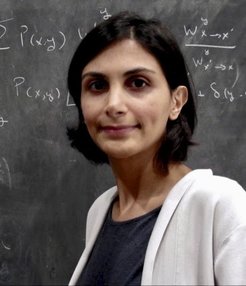Armita Nourmohammad receives Early Career Award for Biological Physics
Armita Nourmohammad, Max Planck Research Group Leader at the Max Planck Institute for Dynamics and Self-Organization (MPIDS) and Assistant Professor of Physics at the University of Washington received the Early Career Award from the American Physical Society (APS), Division of Biological Physics. The annual award recognizes outstanding and sustained contributions by an early-career researcher to biological physics. In choosing Armita Nourmohammad as the laureate, the committee honors her valuable contributions at the interface of statistical physics and biology.

Armita is a theoretical physicist by training. Already from the beginning of her career, she was interested in the interplay between physics and biology, especially with regards to the complex dynamics of evolving populations. Her research comprises a broad range of topics, including non-equilibrium statistical physics, evolutionary biology, and immunology. Her research group aims to contribute to the understanding of biological systems through theoretical models and statistical inference from molecular data. One central focus of her group is the adaptive immune system: Her team aims to understand the principles underlying the organization and encoding of information in the adaptive immune system, in light of host-pathogen coevolution.
An award for fundamental contributions
According to APS, the Early Career Award is given to researchers who contribute to the advancement of biological physics and thus recognizes the fundamentally interdisciplinary nature of biological physics. The committee decided to award it to Armita Nourmohammad “For the creative development of theoretical and data-driven approaches to the dynamics and evolution of the adaptive immune system, grounded in non-equilibrium statistical physics and information theory.”
Happy about the recognition of her work, Armita comments: “I am humbled and honored by this recognition and very proud of my entire team who have made this an exciting scientific journey.” The award will be presented at the APS meeting in March 2022 where the laureate will also give a talk about her research.
